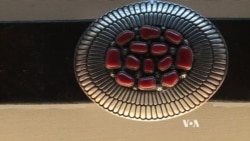Turquoise, coral, opal and silver are tools in the hands of master Navajo jewelers. The Yazzie family has been making contemporary Navajo jewelry for decades and now their work is being celebrated in a museum in New York. The exhibition comes as President Obama opens the 2014 White House Tribal Nations Conference in Washington.
For generations the Yazzie family has been using traditional Navajo techniques to make jewelry in America's Southwest. The concho, the squash blossom and the sun are traditional imagery found in many of their pieces.
The National Museum of the American Indian in New York is showcasing four decades of work by brothers Lee and Raymond Yazzie. They are elders the famous jewelry-making family, whose work has been - up to now - dispersed among private collections.
Lee is known for his silversmithing, which was introduced to the Navajo centuries ago by Spanish colonists. He uses silver to encase the jewels, which in Navajo tradition have a spirit.
"Many times my father would tell my mother to respect this work. It is sacred, you know the turquoise was sacred," said Lee.
Ray, who has been making jewelry since his early teens, is renowned for his stone work. He focuses on Hozho, a Navajo concept that prizes balance and beauty in art and life.
"It takes a long time to get everything together especially the different color coral. It takes a few months or even a couple of years to get all the different colors together," said Ray.
The museum exhibit, which includes works owned by 50 private collectors, is called "Glittering World: Navajo Jewelry of the Yazzie Family." Glittering world refers to the Navajo name for the realm of light and sun in which all beings live.
"This is an influence directly on their jewelry and the colors of the landscape, the light. Navajo belief about light and color," said Curator Kathleen Ash-Milby.
Collectors pay a lot for Yazzie artwork. Abby Kent Flythe has been enamored with Navajo jewelry since she was just seven. Now she is a dealer.
“Because of the materials and the time it takes them to make and the skills they’ve developed over the years it can go quite high," she said. "Up in the…over the hundred-thousand range."
Dozens of Yazzies came to New York City for the gallery opening, which coincided with an award from their home state of New Mexico. For Ray, the experience was overwhelming.
"You go through life and you put pieces together and because they go into collections, then the public never really gets to see the pieces that you make and so through the years I always wondered when am I going to get the recognition that I want, you know? When are people going to see what I can do," she asked.
The 300-piece exhibit will be on display for one year. The curator says the show is just one part of the larger, contemporary American Indian story.





